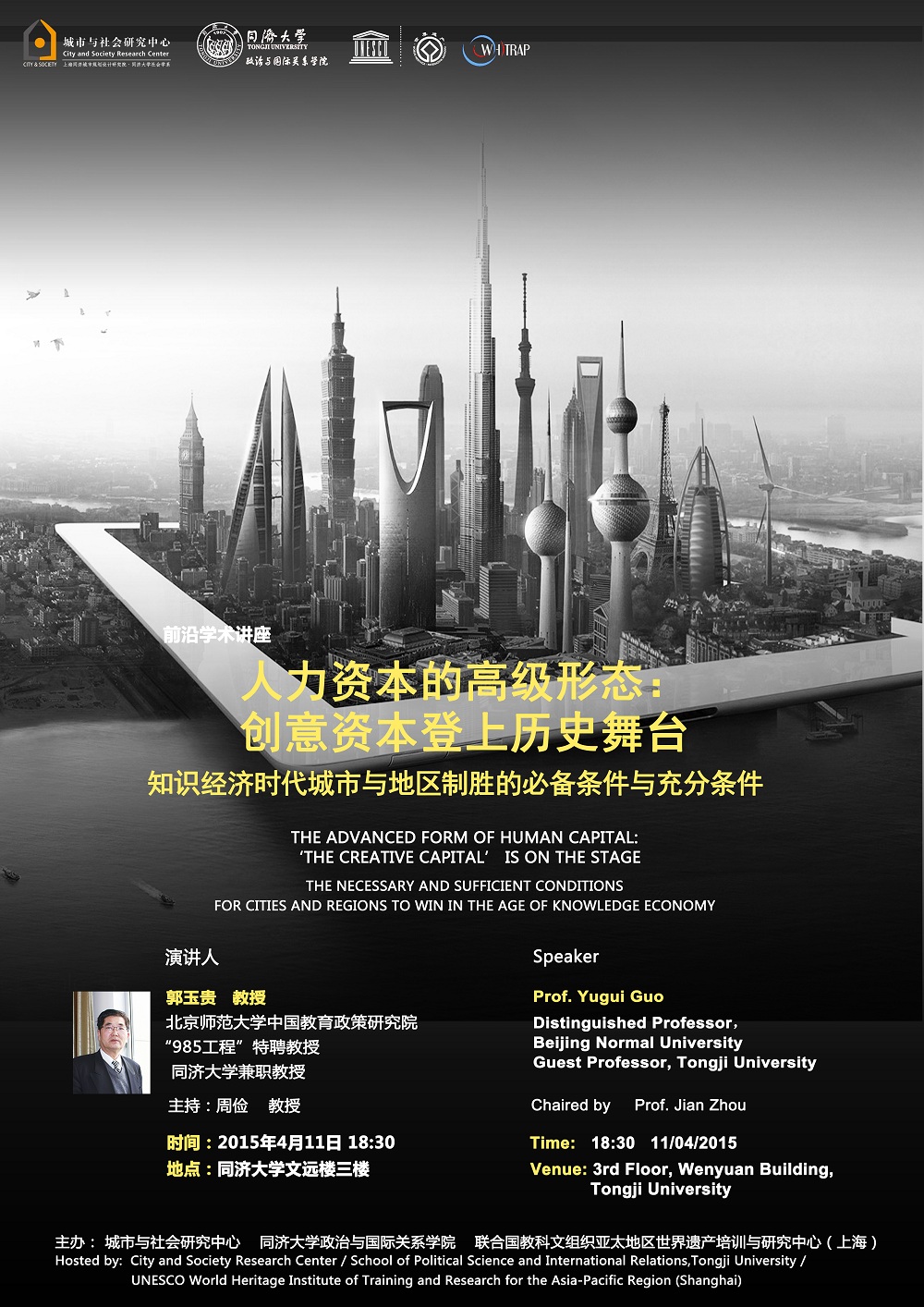新闻中心



讲座题目:
人力资本的高级形态:“创意资本”登上历史舞台——知识经济时代城市与地区制胜的必备条件与充分条件
演讲人:
郭玉贵教授
现为北京师范大学中国教育政策研究院/国际与比较教育研究院“985工程”特聘教授、原上海财经大学高等研究院全球教育研究中心主任,同时担任同济大学兼职教授、美国亚洲文化学院国际教育研究中心主任、中国民主促进会中央委员会参政议政特邀研究员、中国行政体制改革研究行政文化委员会理事、中国国际人才专家委员会特邀研究员、美国国家科学基金会咨询顾问、中华教育改进社理事和美国智库Bridging Nations学术顾问等国内外多个学术职务。
郭玉贵教授1992年出国之前曾任复旦大学助理教授。他在国内外分别接受过四次正规大学教育:1976年毕业于华东师范大学外语系俄语专业、1985年毕业于上海师范大学英语本科专业、1989年毕业于华东师范大学比较教育研究所获硕士学位、1998年毕业于美国纽约州布法罗大学获国际比较教育政策博士学位。
近30年来,郭玉贵教授在国内外主要从事全球化和知识经济有关的科技、教育和人才发展战略研究、中美教育改革和发展中的重大战略性问题以及知识经济时代城市与地区发展的制约性因素等研究。凭借通晓英语和俄语的特殊优势,他在国内外发表文章80多篇。2005年,美国 Lexington Books 出版社出版了郭玉贵博士的英文专著“Asia’s Educational Edge: Current Achievements in Japan,Korea, Taiwan, China, and India”(《亚洲的教育优势:日本、韩国、中国大陆和台湾及印度的当前教育成就》)。该书自出版以来,已有包括美国、加拿大、英国、澳大利亚、荷兰、挪威、香港、新加坡等至少15家主要国际教育学术刊物的学者对其撰写书评和评论,并为多所美国大学列为教材或教学参考书。美国驻中国大使馆(北京)也将该书列入其官方网站上,作为了解亚洲、特别是中国教育制度的主要参考书之一。
主持:周俭教授
时间:2015年4月11日(周六)下午6:30
地点:同济大学文远楼三楼
讲座内容:
30年来,美国主要大都市和地区经历了一个重新洗牌的过程。创意资本理论即揭示了,从工业经济向知识经济转换过程中,这些都市和区域如何各自经历淘汰、革新、复兴、崛起等过程。目前的知识经济与传统经济的一个最为明显的区别,就是价值的创造主体发生了重要转变,以物质资本为核心的价值体系逐步转变为以创新为核心的知识资本价值创造体系。创意已成为攸关一个城市、一个地区或一个国家发展的原动力。创意资本理论不仅确证,有一种类型的人力资本,也即创意人,是经济增长的关键,而且进一步辨认出了影响这些人士选择地点的根本因素。创意阶层的聚集为地方带来创意资本,而创意阶层之所以会聚集在特定的地方,是因为该地方具有独特的性质与吸引力。为解释创意阶层与特定地域之间的关系,创意资本理论提出了经济增长的“三T”公式,即科技(technology)、人才(talent)与包容(tolerance)。这场讲座将结合创意资本理论,分析30年来美国主要大都市重新洗牌的过程,以作为中国城市发展的经验。
PRESENTATION
Topic
The Advanced Form ofHuman Capital: ‘the Creative Capital’is on the Historical Stage --- theNecessary and Sufficient Conditions for Cities and Regions to win in the Age ofKnowledge Economy
Lecturer
Prof. YuguiGuo
Dr. Yugui Guo is “985 Program” DistinguishedProfessor of International and Comparative Education at the China Institute ofEducation Policy at the Beijing Normal University and immediate past Directorof the Center for Global Studies in Education at Shanghai University of Financeand Economics, China. He is currently also serving as Guest Professor of TongjiUniversity, Professor and Director of the Center for International Studies inEducation at the US Asian Cultural Academy, Research Consultant to the USNational Science Foundation, and Academic Advisor of the Bridging Nations.Hismain research interests are international and comparative education, globaleducational development and trends, education policies and reforms in the USAand China, creative capital and regional development.
Prof. Yugui Guo hadworked as Assistant Professor at one of the leading universities in China—FudanUniversity--- right before he came to the United States in 1992. He studied atSUNY, Buffalo, from which he earned his Ph.D. degree in 1998. Being atrilingual --- Chinese, English and Russian, he has conducted quite a number ofresearch projects covering a variety of topics related to the education,S&T policy and human development in the Asian and Pacific region, NorthAmerica, and Europe. More than 80 papers and 4 books were published in bothdomestic and international journals. He is a frequent speaker invited atconferences and forums including the US DOS/DOC/NSB/NSF, the APEC, the VOA, theBEST, and a number of other academic institutions both in USA and China.
Chaired by
Prof. Jian Zhou
Date: 6:30 pm,April11, 2015 (Saturday)
Venue:3rd floor, Wenyuan Building, Tongji University
Lecture Description:
By the creative capital theory, the keydifference between the knowledge economy and the traditional economy lies inthe critical change of the creative forces of value. The value system with thematerial capital as core has been gradually shifting to that of knowledgecapital with the innovation as core. Creativity has become the primary drivingforces of development of every city, region and nation. The creative capitaltheory explicitly illustrates the features, scale, evolving process and trendsof the development of creative economy and the necessary social conditions forits development. The most sticking contribution and feature of this theory isto find and define the group of “the creative class” and its composite,character, value, unique life style, and multi-factors to attract them as wellas the decisive role the creative class plays in social development of a regionand a nation.Grounded on the above creative capital theory,the lecture will analyze the experience and lessons drawn by the Americancities and regions from their past 30 year shifting process from industrialeconomy to knowledge economy. We believe that both of their experience andlessons will serve as inspiration and reference to Shanghai and other citiesand regions in China which aim at building innovation centers.
